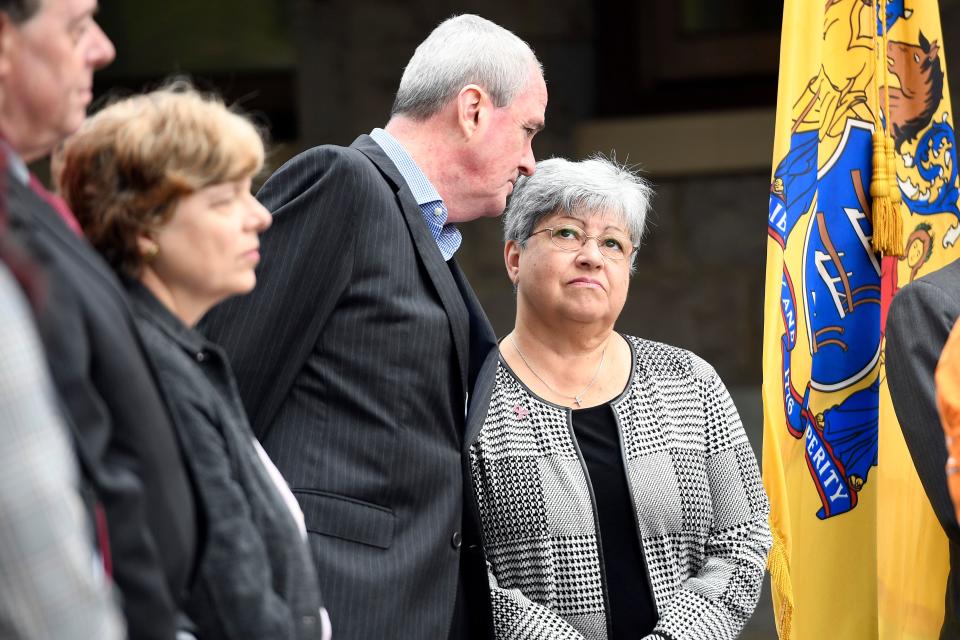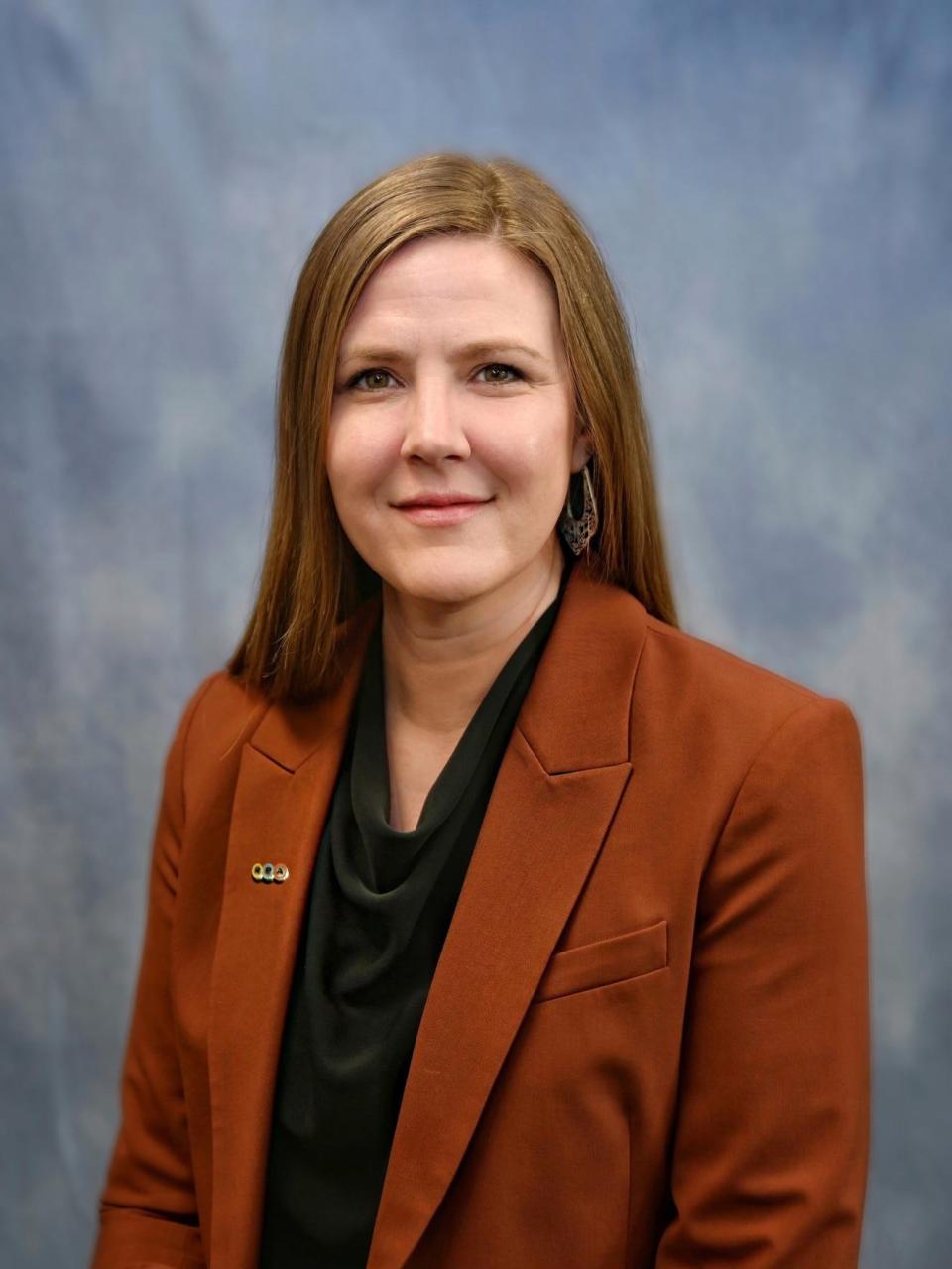NJ gets $425M windfall for transportation projects. Are any of them in your town?
- Oops!Something went wrong.Please try again later.
The irony of Gov. Phil Murphy's announcement on Wednesday that the state will receive an extra $425 million from the Federal Highway Administration was not lost on him.
Despite the fact that the state of New Jersey is currently suing the agency, it decided to extend another nearly half a billion dollars to the Garden State — and even allow the state the flexibility to use the money for transportation projects that wouldn't normally fall under the agency's eligibility criteria.
"We don’t have to agree on everything, but we can agree on most things and still have a good working relationship," said Murphy, who heaped praise on the agency at Wednesday's press conference in Long Branch — an agency whose decision-making the Murphy administration questioned in a 68-page lawsuit in July, saying then that it "short-circuited" by green-lighting an environmental review of a plan for congestion pricing in Manhattan.
Murphy said $425 million amounts to a "huge deal no matter how you slice it." He said the agreement "speaks to the high level of trust that the FHWA has in us and in our ability to use those funds wisely, and for that again we cannot thank our federal partners enough."
Some money to NJ Transit, some to DOT
The money will be split up, with $315 million going to NJ Transit and $110 million going to the state Department of Transportation. It will fund a "range of mass transit projects across the state," Murphy said, including retrofitting bus stations for a zero-emissions future, making stations more accessible, expanding bus terminals and improving train stations that are susceptible to flooding.

About $7.9 million will cover the remaining balance the city of Long Branch needed to construct a $21.1 million pedestrian tunnel that will connect residents to the downtown, where they can access a local hospital, education centers, shops and restaurants. The area was split off by North Jersey Coast Line train tracks first built in 1875.
"What we’re doing here with this transit village concept is making it so the town is united, but also the institutions around here," said U.S. Rep. Frank Pallone, a Democrat whose district includes Long Branch. "This is all the levels of government working together to achieve a common purpose here."
About $15 million will go toward a new bus terminal in the Passaic business district that can hold higher-capacity buses and to construct new bus shelters.
What makes this money so unusual
The $425 million in FHWA money New Jersey is receiving is from an annual process called "August redistribution," when states return to the agency money they were not able to use. Then, state transportation agencies have a small window to apply for that leftover money and put it toward other projects, or else it gets returned to federal coffers.
New Jersey Transportation Commissioner Diane Gutierrez-Scaccetti said receiving $425 million in those redistribution funds is itself remarkable, because in the last six years, under the Murphy administration, the state was awarded $830 million; in the 10 years before that, the state got back a total of about $200 million.
Also, the FHWA is allowing New Jersey to use about three-quarters of that money for public transportation projects that are outside the normal scope of eligibility. "This is such a big deal," Gutierrez-Scaccetti said.

Making all of this happen, said Gutierrez-Scaccetti, who also chairs NJ Transit's board, was a "complex process" that required asking the FHWA to be flexible with the money, included having a Zoom meeting on a Sunday afternoon with Administrator Shailen Bhatt, coming up with a list of shovel-ready projects, and getting last-minute meetings added to board agendas in August to approve the changes.
"The one thing we never want to happen is for money to lapse. We’re not interested in returning it to Congress, we’re interested in spending it in New Jersey," Gutierrez-Scaccetti said. "The real heroes go to the staffs at the agencies.
"There are many more like this team that understand the importance of looking at transportation holistically," she said.
'Chase more, do more, go faster'
The additional $315 million for NJ Transit is significant because it will put a dent in the $2.4 billion gap the agency has in its five-year unconstrained $13.2 billion capital plan.
And the fact that agency officials convinced the FHWA to let the state use the redistribution dollars for NJ Transit shows that the transit agency made smart investments and did proper planning years earlier to make sure it had projects ready to be funded, said Zoe Baldwin, the New Jersey director for the Regional Plan Association.

"Using state funding to build up a backlog of design is smart for exactly this reason, because the key to success in transportation is being able to spring the moment there’s an opportunity," Baldwin said. "The No. 2 job of a transit agency, behind moving people, is maintaining and expanding the system and making it work better."
NJ Transit has "really come a long way in that," she said.
One of NJ Transit President and CEO Kevin Corbett's first tasks when he took the helm of the agency in 2018 was to assess the agency's garages, bridges and other infrastructure and determine what needed updates and emergency repairs and then draft a capital plan — the first in recent memory at the agency.
This level of detailed planning gave the agency a road map to show the depth of projects that both did and did not have funding, allowed it to resume long-term planning at a public agency that has many aging assets and out-of-date rolling stock, and enabled it to highlight potential areas for expansion.
In 2017, the year before Murphy took office, NJ Transit had only $60 million worth of projects in construction; since 2018, the agency has advanced nearly $6 billion in projects, including infrastructure improvements and purchasing new trains and buses. Another $8 billion is being planned for the next three years.
This took place even though the Murphy administration and the Legislature perpetuated a 33-year habit of shifting dollars out of NJ Transit's capital fund to cover deficits in its operating budget, including $432 million in fiscal year 2022.
Rich Schaefer, NJ Transit's senior vice president of capital programs, said earlier this year that during the pandemic, Corbett gave him and his team the go-ahead to ramp up work, despite the uncertainty about ridership and money.
"When the pandemic happened, every other railroad, other transit agencies, put all their programs on hold. Kevin specifically told us, 'No. Chase more, do more, go faster. When the money comes back — and it will — you need to be ready,'" Schaefer said.
List of projects
In addition to the $7.9 million for the Long Branch pedestrian tunnel, here is a list of NJ Transit projects for which the money will be used:
Hilton Bus Garage Modernization and Electrification ($68.1 million): An ongoing design effort to modernize the Hilton Bus Garage and prepare the facility for the deployment of battery electric buses (BEB).
Meadowlands Garage Battery Electric Bus Depot ($37.7 million): This project will implement the initial phase of a BEB depot at the Meadowlands bus garage to support the deployment of articulated battery electric buses.
Passaic Bus Terminal ($15 million): A project for an all-new bus terminal in the heart of the Passaic business district.
Watsessing Avenue ($31.6 million) and Roselle Park ($9 million) Station Modernizations: These projects will renovate the stations, providing new platforms and canopies and installing elevators and ramps to allow for full accessibility.
Replacement of six bridges ($106.5 million): These projects will replace bridges in Little Falls, Readington, High Bridge and Bayonne, as well as two in Waterford.
Delco Lead ($33.8 million): This project is part of NJ Transit’s Resilience Program and will construct a storage location at a strategic place along the Northeast Corridor that is not flood-prone.
Hoboken Yard Improvements ($5 million): This project includes design and construction of inspection pits in Hoboken Yard for required periodic inspections of multilevel rail cars, making those cars more readily available for service.
Here is a list of the Transportation Department projects the money will cover. A full list of DOT projects being funded by this arrangement was not available, nor were project estimates, as they will go out to bid later this year.
Portway, Fish House Road/Pennsylvania Avenue, CR 659: This project will realign the roadway and reconfigure the intersection of Central Avenue and Pennsylvania Avenue in Kearny. The roadway improvements will include drainage facilities and quality treatment areas.
Route 42, Kenney Avenue to Atlantic City Expressway: This project will resurface about 3 miles of the highway in both directions in Washington Township, Gloucester County.
This article originally appeared on NorthJersey.com: NJ gets $425M windfall for transportation projects. Here's where

